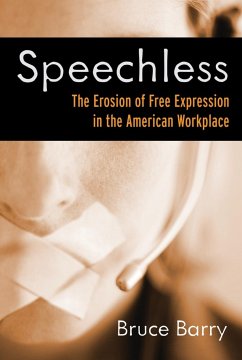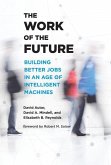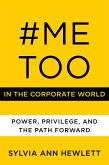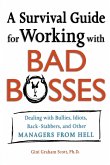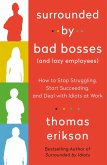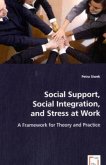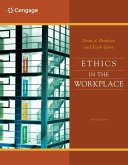Exposes the shameful fact that most Americans are forced to check their civil liberties and especially their freedom of speech at the workplace door. Barbara Ehrenreich, New York Times-bestselling author
A factory worker is fired because her boss disagrees with her political bumper sticker. A stockbroker feels pressure to resign from an employer who disapproves of his off-hours political advocacy. A flight attendant is grounded because her airline doesn t like what she s writing in her personal blog. Is it legal to fire people for speech that makes employers uncomfortable, even if the content has little or nothing to do with their job or workplace? For most American workers, the alarming answer is yes.
In Speechless, Bruce Barry argues that a toxic combination of law, conventional economic wisdom, and accepted managerial practice has created an American workplace in which freedom of speech that most crucial of civil liberties in a healthy democracy is somethingyou do after work, on your own time, and even then (for many), only if your employer approves. Barry proposes changes both to the law and to management practice that would expand employees expressive rights without jeopardizing the legitimate interests of employers.
In defense of freer speech in and around the workplace, Barry argues that a healthy democracy depends in part on the experience of liberty at work. Workplaces are key venues for shared experience and public discourse, so workplace speech rights matter deeply for advancing citizenship, community, and democracy in a free society.
Eye-opening for anyone who has a job. Big Brother isn t just a figment of the imagination. Foreword Reviews
A factory worker is fired because her boss disagrees with her political bumper sticker. A stockbroker feels pressure to resign from an employer who disapproves of his off-hours political advocacy. A flight attendant is grounded because her airline doesn t like what she s writing in her personal blog. Is it legal to fire people for speech that makes employers uncomfortable, even if the content has little or nothing to do with their job or workplace? For most American workers, the alarming answer is yes.
In Speechless, Bruce Barry argues that a toxic combination of law, conventional economic wisdom, and accepted managerial practice has created an American workplace in which freedom of speech that most crucial of civil liberties in a healthy democracy is somethingyou do after work, on your own time, and even then (for many), only if your employer approves. Barry proposes changes both to the law and to management practice that would expand employees expressive rights without jeopardizing the legitimate interests of employers.
In defense of freer speech in and around the workplace, Barry argues that a healthy democracy depends in part on the experience of liberty at work. Workplaces are key venues for shared experience and public discourse, so workplace speech rights matter deeply for advancing citizenship, community, and democracy in a free society.
Eye-opening for anyone who has a job. Big Brother isn t just a figment of the imagination. Foreword Reviews
Barry explains how we lose our freedom of speech every day when we go to work. This is a must-read for anyone who cares about free speech.
Lewis Maltby, President, The National Workrights Institute
A generation of Americans growing up in the age of networking, blogging, and instant messaging will be surprised to learn they park most of their rights to free speech, expression, and association at the door of their workplace. Barry s thorough analysis demonstrates how out of touch this is with our democratic values and suggests reforms that would allow us to be both good citizens and loyal, productive workers. A very good book.
Thomas A. Kochan, George M. Bunker Professor of Management and Co-Director, MIT Workplace Center, and author of Restoring the American Dream: A Working Families Agenda for America
Bruce Barry documents in telling detail how workplace strictures on free expression can adversely affect morale, productivity, and profit. He argues persuasively that too often court rulings have helped enforce a management muzzle to a degree that the law has permitted the evolution of a corporate ethos that offends the political and cultural commitment to free speech in a democratic society.
John Seigenthaler, founding Editorial Director, USA Today; former President, The American Society of Newspaper Editors; and Founder, The Freedom Forum First Amendment Center
Speechless is a new and important contribution to the literature on free speech. For over 200 years Americans have held onto the myth that un- restricted free expression is a right that should be and is respected and protected everywhere in our country. Barry has the audacity to bring into question that myth both theoretically and with a series of examples that challenge our ungrounded beliefs.
Patricia Werhane, Ruffin Professor of Business Ethics, University of Virginia; Wicklander Chair in Business Ethics and Director of the Institute for Business and Professional Ethics, DePaul University; author of Employment and Employee Rights and Moral Imagination and Management Decision-Making
A pioneering, fresh, and thorough analysis of the subtle erosion of American expressive rights. Speechless concludes with a set of bold and sensible steps that legislatures, courts, managers, and workers can take to refashion workplace communities for putting America back on the track toward deliberative democracy.
Daniel B. Cornfield, Editor, Work and Occupations
Lewis Maltby, President, The National Workrights Institute
A generation of Americans growing up in the age of networking, blogging, and instant messaging will be surprised to learn they park most of their rights to free speech, expression, and association at the door of their workplace. Barry s thorough analysis demonstrates how out of touch this is with our democratic values and suggests reforms that would allow us to be both good citizens and loyal, productive workers. A very good book.
Thomas A. Kochan, George M. Bunker Professor of Management and Co-Director, MIT Workplace Center, and author of Restoring the American Dream: A Working Families Agenda for America
Bruce Barry documents in telling detail how workplace strictures on free expression can adversely affect morale, productivity, and profit. He argues persuasively that too often court rulings have helped enforce a management muzzle to a degree that the law has permitted the evolution of a corporate ethos that offends the political and cultural commitment to free speech in a democratic society.
John Seigenthaler, founding Editorial Director, USA Today; former President, The American Society of Newspaper Editors; and Founder, The Freedom Forum First Amendment Center
Speechless is a new and important contribution to the literature on free speech. For over 200 years Americans have held onto the myth that un- restricted free expression is a right that should be and is respected and protected everywhere in our country. Barry has the audacity to bring into question that myth both theoretically and with a series of examples that challenge our ungrounded beliefs.
Patricia Werhane, Ruffin Professor of Business Ethics, University of Virginia; Wicklander Chair in Business Ethics and Director of the Institute for Business and Professional Ethics, DePaul University; author of Employment and Employee Rights and Moral Imagination and Management Decision-Making
A pioneering, fresh, and thorough analysis of the subtle erosion of American expressive rights. Speechless concludes with a set of bold and sensible steps that legislatures, courts, managers, and workers can take to refashion workplace communities for putting America back on the track toward deliberative democracy.
Daniel B. Cornfield, Editor, Work and Occupations

